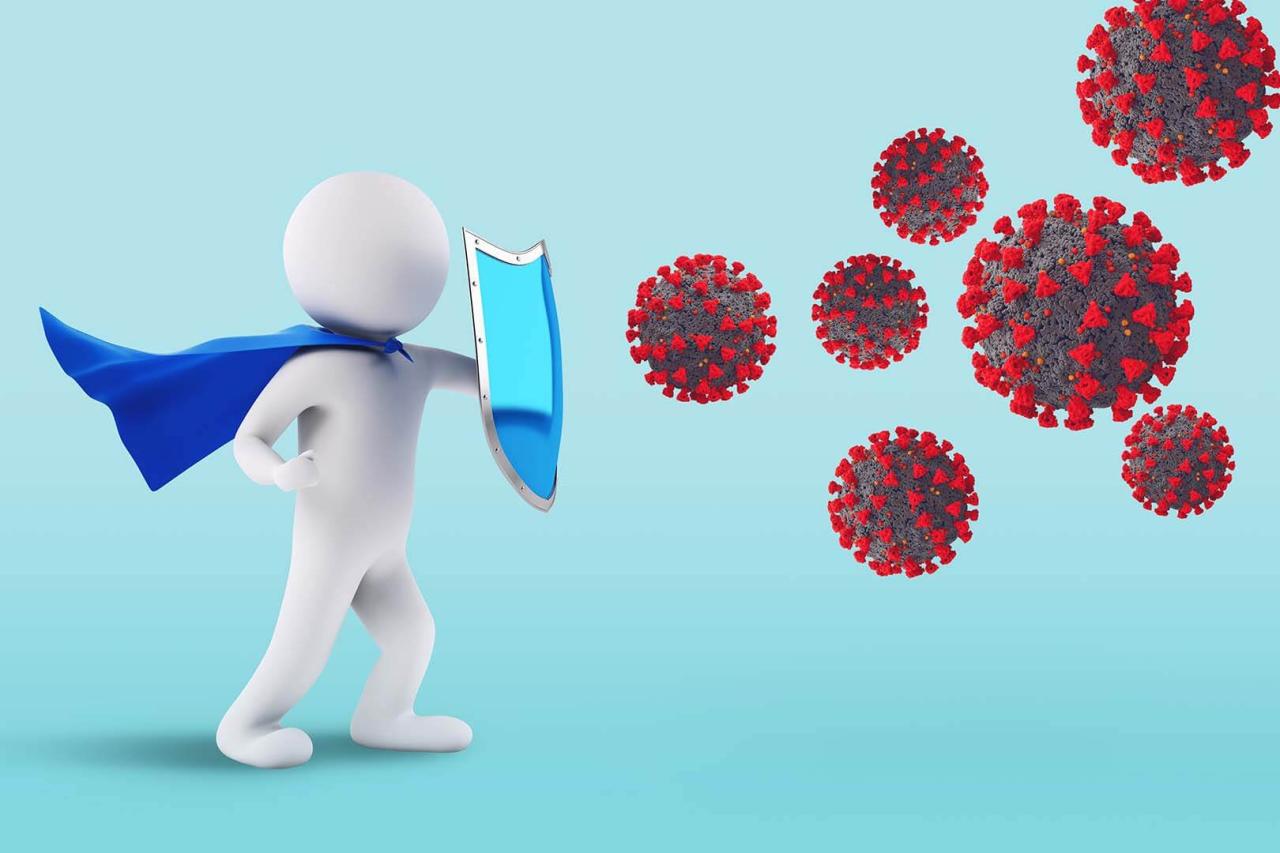
How Working Out Boosts Your Immune System
How working out supports your immune system is a question many ask, and the answer is surprisingly complex and fascinating. It’s not just about getting stronger; exercise plays a vital role in building a robust defense against illness. Think of your immune system as a powerful army, and regular exercise is like training those troops to be stronger and more prepared to fight off invaders.
From boosting white blood cell production to reducing inflammation and improving sleep, exercise has a profound impact on your body’s ability to ward off infections. This article will delve into the science behind how exercise strengthens your immune system, exploring the specific ways it enhances your body’s natural defenses.
The Role of Exercise in Immune Function
Regular physical activity plays a crucial role in supporting and strengthening your immune system. It’s not just about feeling good; exercise can actively enhance your body’s natural defenses against illness.
The Impact of Exercise on White Blood Cell Production and Activity
Exercise acts as a stimulant for the immune system, prompting the production and activity of white blood cells, which are the body’s primary defense against infections. These cells are essential for recognizing and eliminating harmful pathogens like bacteria, viruses, and parasites.
During exercise, your body releases stress hormones like adrenaline and cortisol. These hormones, in turn, stimulate the production of white blood cells, particularly neutrophils and natural killer (NK) cells.
Neutrophils are a type of white blood cell that engulf and destroy bacteria, while NK cells target and eliminate virus-infected cells and cancer cells. Increased production of these cells helps your body mount a more robust and efficient immune response.
The Role of Cytokines in Immune Regulation
Exercise also influences the release of cytokines, which are small proteins that act as messengers between cells, regulating immune responses. Some cytokines promote inflammation, while others suppress it, ensuring a balanced immune response.
Moderate exercise can increase the production of anti-inflammatory cytokines, such as interleukin-10 (IL-10), while reducing the production of pro-inflammatory cytokines, like tumor necrosis factor-alpha (TNF-α).
A strong immune system is crucial for overall health, and regular exercise plays a vital role in supporting it. By boosting blood circulation and promoting the production of white blood cells, working out helps your body fight off infections.
After a tough workout, refueling with a protein-packed meal is essential, and these hearty burgers with up to 38 grams of protein are a great option for replenishing your muscles and fueling your next workout. Remember, a healthy lifestyle, including exercise and a balanced diet, is the key to a strong immune system.
This shift towards an anti-inflammatory profile helps to regulate the immune system and prevent excessive inflammation, which can be detrimental to overall health.
Working out is a powerful tool for boosting your immune system, but you might be unknowingly sabotaging your efforts. Did you know there are 6 sneaky ways you might be losing muscle? Check out this article to see if any of these apply to you.
By addressing these issues, you can ensure your body is strong and resilient, allowing you to reap the full benefits of a healthy workout routine and a robust immune system.
Exercise and Inflammation
Inflammation is a natural and essential process that helps your body heal and fight off infections. When you get injured or sick, your immune system sends white blood cells to the affected area to fight off the invaders and repair the damage.
This process involves the release of chemicals that cause swelling, redness, pain, and heat, which are the hallmarks of inflammation.However, chronic inflammation, which persists for a long time, can be harmful to your health. It is linked to many chronic diseases, including heart disease, diabetes, cancer, and arthritis.
The Effects of Exercise on Inflammation
Exercise can have both positive and negative effects on inflammation, depending on the intensity and duration of the workout. Moderate exercise, such as brisk walking, swimming, or cycling for 30 minutes most days of the week, generally reduces inflammation. It triggers the release of anti-inflammatory cytokines, which help to dampen the inflammatory response.
Moderate exercise can help to reduce chronic inflammation and improve your overall health.
Intense exercise, such as high-intensity interval training (HIIT) or marathon running, can temporarily increase inflammation. This is because it causes muscle damage and stress, which triggers the release of pro-inflammatory cytokines. However, this increase in inflammation is usually short-lived and followed by a period of adaptation, where the body becomes more resilient to inflammation.
Intense exercise can temporarily increase inflammation, but it can also lead to long-term adaptations that reduce inflammation.
The Role of Exercise in Reducing Chronic Inflammation
Exercise can help to reduce chronic inflammation in several ways.* Improved Insulin Sensitivity:Regular exercise improves insulin sensitivity, which helps to reduce inflammation in the body. Insulin resistance is a key factor in chronic inflammation, particularly in conditions like type 2 diabetes.
Reduced Body Fat Exercise helps to reduce body fat, which is a major source of inflammation. Excess body fat, especially visceral fat, releases pro-inflammatory chemicals that contribute to chronic inflammation.
Increased Anti-Inflammatory Cytokine Production Exercise stimulates the production of anti-inflammatory cytokines, which help to suppress the inflammatory response.
Improved Blood Flow Exercise improves blood flow, which helps to deliver oxygen and nutrients to tissues and remove waste products. This helps to reduce inflammation and promote healing.
Keeping your body strong through regular exercise is crucial for a robust immune system, but sometimes, unexpected factors can hinder your progress. It’s important to be aware that certain medications can contribute to weight gain, which can impact your overall health and ability to maintain a healthy lifestyle.
If you’re struggling with weight gain, it’s worth exploring could your medications be causing weight gain. By understanding the potential impact of medications, you can work with your doctor to find solutions and continue to build a strong and healthy immune system.
Exercise can help to reduce chronic inflammation by improving insulin sensitivity, reducing body fat, increasing anti-inflammatory cytokine production, and improving blood flow.
Exercise and Stress Reduction: How Working Out Supports Your Immune System

Exercise is a powerful tool for managing stress, and its benefits extend to our immune system. When we engage in physical activity, our bodies release endorphins, which have mood-boosting and pain-relieving effects. This natural “high” helps to alleviate feelings of anxiety and tension, promoting a sense of calm and well-being.
The Impact of Stress Reduction on the Immune System, How working out supports your immune system
Stress reduction through exercise plays a crucial role in strengthening our immune defenses. When we’re stressed, our bodies release hormones like cortisol, which can suppress the immune system’s ability to fight off infections. Regular exercise, however, helps to regulate cortisol levels and reduce the negative impact of stress on our immune cells.
Chronic Stress and Weakened Immune Function
Chronic stress can significantly weaken the immune system, making us more susceptible to illnesses. Prolonged exposure to stress hormones disrupts the balance of immune cells, leading to a decline in their effectiveness. This can manifest as increased susceptibility to infections, slower wound healing, and a higher risk of developing chronic diseases.
Exercise and Infection Risk

Regular exercise is not only beneficial for physical health but also plays a crucial role in boosting the immune system, making you less susceptible to infections. This section explores the connection between exercise and infection risk, highlighting how physical activity can strengthen your body’s natural defenses.
Benefits of Exercise for Infection Prevention
Engaging in regular physical activity can significantly reduce your risk of developing infections. Exercise strengthens your immune system in several ways, making it more effective at fighting off pathogens.
- Improved Circulation:Exercise enhances blood flow throughout the body, delivering oxygen and nutrients to cells and tissues, including those involved in immune function. This improved circulation allows immune cells to reach areas of infection more quickly and effectively.
- Increased White Blood Cell Count:Exercise stimulates the production of white blood cells, the primary defenders against infections. These cells are responsible for identifying and destroying harmful pathogens.
- Enhanced Immune Cell Function:Regular exercise improves the function of immune cells, making them more efficient at recognizing and eliminating pathogens.
- Reduced Inflammation:Moderate exercise can help reduce chronic inflammation, a state that can suppress immune function and make you more vulnerable to infections.
Exercise and Recovery from Illness
Not only can exercise help prevent infections, but it can also aid in recovery from illness. When you are sick, your body’s energy levels and immune function are often compromised. However, moderate exercise can help you recover faster by:
- Boosting Energy Levels:Exercise can help improve energy levels and reduce fatigue, making it easier to cope with the symptoms of illness.
- Reducing Inflammation:Exercise can help reduce inflammation associated with illness, promoting faster healing.
- Improving Mood:Exercise can help alleviate stress and improve mood, which can further support recovery.
Exercise Recommendations During and After Illness
When you are ill, it is important to listen to your body and avoid strenuous activity. However, moderate exercise can be beneficial during and after illness. Here are some recommendations:
- During Illness:If you have a mild illness, such as a cold or flu, light exercise, such as walking or gentle stretching, can help improve circulation and reduce symptoms. Avoid exercise if you have a fever or feel extremely weak.
- After Illness:Once you have recovered from illness, gradually increase your exercise intensity and duration. Start with light activities and gradually progress to more challenging workouts. Listen to your body and rest when needed.
Last Word
Incorporating regular exercise into your routine is a powerful tool for boosting your immune system and improving your overall health. By understanding how exercise works on a cellular level, we can make informed choices to support our bodies’ natural defenses.
Remember, consistency is key. Even moderate exercise can have a significant impact on your immune health, so find an activity you enjoy and make it a part of your lifestyle.






